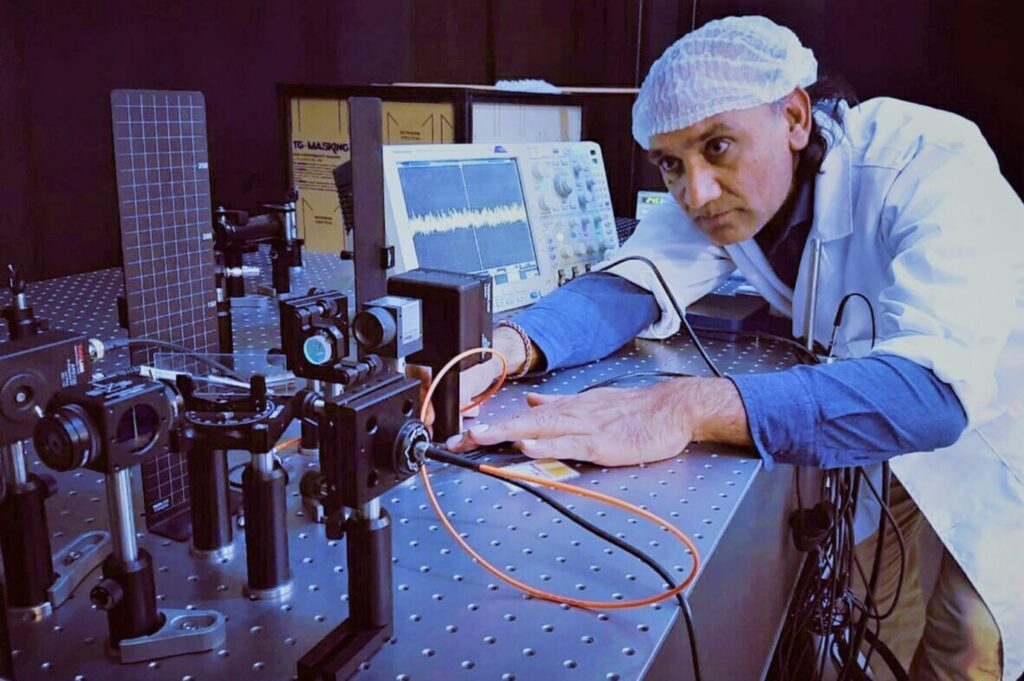
PRESS RELEASE — ColdQuanta, Riverlane and the University of Wisconsin–Madison, today announced they have successfully run a quantum algorithm on a cold atom qubit array system, codenamed “AQuA,” an industry first that brings quantum computing one step closer to real world applications. The milestone was conducted at the University of Wisconsin–Madison in the research group led by Professor Mark Saffman. A paper on the research was published today in Nature, the world’s leading multidisciplinary science journal.
Gate model quantum computers promise to solve currently difficult computational problems if they can be operated at scale with long coherence times and high fidelity logic. Cold atom hyperfine qubits provide inherent scalability due to their identical characteristics, long coherence times, and ability to be trapped in dense multi-dimensional arrays.
The team is the first in the world to demonstrate quantum algorithms on a programmable gate model cold atom quantum computer. An architecture was used in which individual atoms are addressed with tightly focused optical beams scanned across a two-dimensional array of qubits.
The team achieved the preparation of entangled Greenberger-Horne-Zeilinger (GHZ) states with up to 6 qubits, quantum phase estimation for a chemistry problem, and the Quantum Approximate Optimization Algorithm (QAOA) for the MaxCut graph problem. These results highlight the highly scalable capability of cold atom qubit arrays for universal, programmable quantum computation, as well as preparation of non-classical states of use for quantum enhanced sensing.
“There’s a race to build a useful quantum computer, and there’s a handful of different approaches that are being developed including cold atom qubits,” said Dr. Mark Saffman. “This is the first quantum computer using cold atoms with multiple qubits and running quantum algorithms, so it’s a significant step forward for the cold atom approach.”

Dr. Ophelia Crawford, Senior Quantum Scientist at Riverlane, said, “Combining Riverlane’s expertise in quantum algorithms and quantum chemistry with ColdQuanta and UW-Madison’s deep knowledge of hardware was crucial to successfully implementing QPE in this project. Close partnerships like this will be vital for tackling the scientific and engineering challenges that must be overcome to get to useful quantum computers sooner than previously imaginable.”
ColdQuanta will soon launch Hilbert, a 100-qubit scale computer that builds on the groundbreaking work conducted in this research. Leveraging the natural scalability of the Cold Atom approach, the Hilbert platform will offer strong connectivity, fidelity, and miniaturization with systems operating at room temperature.
As members of the Chicago Quantum Exchange, UW–Madison and ColdQuanta are among the industry leaders that have helped the Chicago region, including Madison, Wis., emerge as a leading hub of quantum research nationally.
About ColdQuanta
ColdQuanta is a global quantum technology company solving the world’s most challenging problems. The company harnesses quantum mechanics to build and integrate quantum computers, sensors, and networks. From fundamental physics to leading edge commercial products, ColdQuanta enables “quantum everywhere” through our ecosystem of devices and platforms. Founded in 2007, ColdQuanta grew from decades of research in atomic physics and work at JILA, with intellectual property licensed through the University of Colorado and University of Wisconsin. ColdQuanta’s scalable and versatile cold atom technology is used by world-class organizations around the globe and deployed by NASA on the International Space Station. ColdQuanta is based in Boulder, CO, with offices in Madison, WI and Oxford, UK. Find out how ColdQuanta is building the future atwww.coldquanta.com.
The name ColdQuanta and the ColdQuanta logo are both registered trademarks of ColdQuanta, Inc.
About Riverlane
Riverlane’s mission is to make quantum computing useful far sooner than previously imaginable, starting an era of human progress as significant as the industrial and digital revolutions. To fully unlock the massive potential of quantum computing, we need a circa 10,000x increase in the size and reliability of quantum computers. We play a key role in achieving this by building Deltaflow.OS – the operating system for quantum computing. This starts with breaking through the biggest barrier to quantum computing today: quantum error correction. Doing so can accelerate the development of useful, fault tolerant, commercially viable quantum computers by up to a decade. Being hardware obsessed and commercially driven means we work closely with leading quantum hardware companies representing every qubit technology. We’re backed by venture capital funding from Molten Ventures, Cambridge Innovation Capital, Amadeus Capital Partners and the University of Cambridge.
About University of Wisconsin–Madison
Since its founding in 1848, UW–Madison has been a catalyst for the extraordinary. As a public land-grant university and prolific research institution, our students, staff, and faculty members partake in a world-class education and solve real-world problems. We’ve inspired satirists and senators alike. We’ve fearlessly sifted and winnowed to find today’s truths. And with the Wisconsin Idea as our guiding principle, we’re not only changing the 936 acres we call home—Badgers are also creating a better future for Wisconsin, the nation, and the world.
If you found this article to be informative, you can explore more current quantum news here, exclusives, interviews, and podcasts.



















